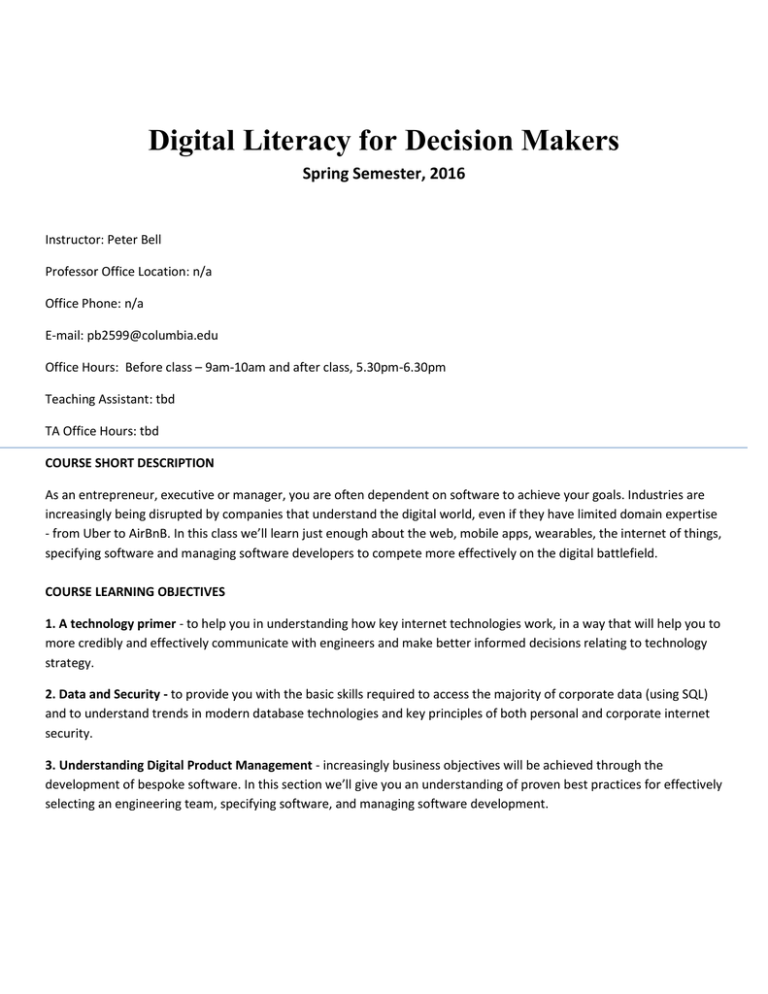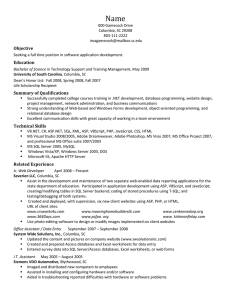Digital Literacy for Decision Makers Spring Semester, 2016
advertisement

Digital Literacy for Decision Makers Spring Semester, 2016 Instructor: Peter Bell Professor Office Location: n/a Office Phone: n/a E-mail: pb2599@columbia.edu Office Hours: Before class – 9am-10am and after class, 5.30pm-6.30pm Teaching Assistant: tbd TA Office Hours: tbd COURSE SHORT DESCRIPTION As an entrepreneur, executive or manager, you are often dependent on software to achieve your goals. Industries are increasingly being disrupted by companies that understand the digital world, even if they have limited domain expertise - from Uber to AirBnB. In this class we’ll learn just enough about the web, mobile apps, wearables, the internet of things, specifying software and managing software developers to compete more effectively on the digital battlefield. COURSE LEARNING OBJECTIVES 1. A technology primer - to help you in understanding how key internet technologies work, in a way that will help you to more credibly and effectively communicate with engineers and make better informed decisions relating to technology strategy. 2. Data and Security - to provide you with the basic skills required to access the majority of corporate data (using SQL) and to understand trends in modern database technologies and key principles of both personal and corporate internet security. 3. Understanding Digital Product Management - increasingly business objectives will be achieved through the development of bespoke software. In this section we’ll give you an understanding of proven best practices for effectively selecting an engineering team, specifying software, and managing software development. COURSE ROADMAP/SCHEDULE Session 1. A Technology Primer - 6 hours Technologies that power the Internet (browser, laptop, WiFi, routers, DNS servers, web server(s)) The languages of the web (HTML, CSS, JS, common server side languages and frameworks) Front end vs back end development (understanding the difference and trends such as Single Page Apps) A modern web architecture (showing typical architectures for MVPs and for more scalable systems) From desktop to tablet and mobile (trends in interaction) Mobile web (mobile first, responsive design, common frameworks) Mobile apps (native and intermediate technologies, penetration, cross-platform strategies) Mobile strategies (site vs. app vs. both) Beyond the phone (wearables and the future of advertising, interaction and habit design) The accelerating pace of change (and its implications for business strategy) Session 2. Data and Security - 6 hours SQL - Unlocking business value from your data Trends in Database Technologies (NoSQL - key/value, column, document, immutable and graph - and New SQL) The basics of big data (tools and techniques - what it can and can’t do) Personal internet security (practical security self defense) Corporate internet security (understanding corporate InfoSec risks and strategies) The Internet of Things (what happens when everything is online?) Understanding API’s (the opportunities of both creating and consuming APIs) 3. Understanding Digital Product Management - 6 hours The lean startup (why software isn’t usually the best starting point) Approaches to validating assumptions (alternatives to coding) Building the team (finding, evaluating and motivating technical talent) The problem with prototypes and mockups (issues with traditional approaches to specifying software) Understanding Agile (the Agile manifesto, key agile principles and best practices) User stories (the Connextra format, what makes a good user story) From incremental to iterative (handling innovation risk) Best practices for software development (the basics of Continuous Delivery and the underlying principles) Technologies for managing tech teams (features, bugs, code review, chat) Using GitHub to manage a tech team (history of Git and GitHub, the “GitHub workflow” workflow, branches, commits, using the web interface, forks for low trust collaboration, single repo collaboration using feature branches and pull requests, issues and pulse) Page 2 of 3 ASSIGNMENTS/METHOD OF EVALUATION Your grade for this course will be based on a combination of individual assignments (quizzes and case studies) and group assignments. The online quizzes will be designed to test a combination of retention, understanding of the underlying concepts and ability to research additional information online. The individual case studies will be graded 75% based on the quality of the recommendations and 25% on the clarity of the written communication. The group projects will be graded equally based upon the quality of the output/outcomes and the use of the concepts from the class to collaborate effectively. REQUIRED COURSE MATERIALS You should get a copy of the following two books: http://www.amazon.com/Pragmatic-Programmer-Journeyman-Master/dp/020161622X http://www.amazon.com/Introducing-GitHub-A-Non-Technical-Guide/dp/1491949740 CLASSROOM NORMS AND EXPECTATIONS Because of the small number of sessions, attendance at all three sessions is required. Eating/drinking in class is allowed. Please bring a laptop to class. For substantial periods of the class I’ll ask you to put the laptops away so we can focus on interacting with the material, but there will be exercises that require a laptop with internet access. Class will start on time, so please try to be in the classroom 10 minutes before the scheduled start time. INCLUSION, ACCOMMODATIONS, AND SUPPORT FOR STUDENTS At Columbia Business School, we believe that diversity strengthens any community or business model and brings it greater success. Columbia Business School is committed to providing all students with the equal opportunity to thrive in the classroom by providing a learning, living, and working environment free from discrimination, harassment, and bias on the basis of gender, sexual orientation, race, ethnicity, socioeconomic status, or ability. Students seeking accommodation in the classroom may obtain information on the services offered by Columbia University’s Office of Disability Services online at www.health.columbia.edu/docs/services/ods/index.html or by contacting (212) 854-2388. Page 3 of 3

